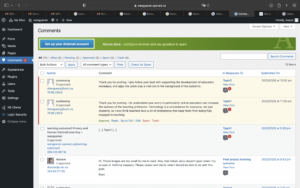After read the topic1 ,the public  should be most concerned about how to protect their personal information and data from being leaked. We use all kinds of social media in our daily life. While users are enjoying the pleasure brought by social media, they are also paying more and more attention to the protection of personal privacy. As we all know, when we first registered for social media, We will all be asked by the platform for personal information, including basic information such as name, age, gender, etc. Although all social media will have their own privacy protection measures, in recent years, social media leaks of users’ personal information have happened repeatedly. So how is our information leaked on this social media software? First, when a user registers and fills in personal information, the user’s information is transmitted to the platform. Using the existing big data technology, the platform can quickly judge the user. Most platforms will secretly collect users’ personal information without the user’s knowledge, such as takeaway software, which will secretly collect information such as personal address and other information based on the user’s order information. For another example, some short video platforms will also actively push some content to users according to the frequency and content of users’ viewing, etc., and users’ personal preferences will be recorded by the platform unknowingly. In addition, some platforms will push advertisements for users based on this, inducing users to make irrational consumption. So is there a positive side to the way users’ personal data is collected? The answer is also yes. For the construction of a personal learning network, collecting users’ data can analyze users’ preferences for certain functions. For example, in the field of education, students’ personal data can be collected, and the platform can know which content is popular based on the number of viewings by students. Helps improve personal learning networks and make the user experience better. Regan, P., & Jesse, J. (2019). Ethical challenges of edtech, big data and personalized learning: Twenty-first century student sorting and tracking. Ethics and Information Technology, 21(3), 167-179. DOI: 10.1007/s10676-018-9492-2
should be most concerned about how to protect their personal information and data from being leaked. We use all kinds of social media in our daily life. While users are enjoying the pleasure brought by social media, they are also paying more and more attention to the protection of personal privacy. As we all know, when we first registered for social media, We will all be asked by the platform for personal information, including basic information such as name, age, gender, etc. Although all social media will have their own privacy protection measures, in recent years, social media leaks of users’ personal information have happened repeatedly. So how is our information leaked on this social media software? First, when a user registers and fills in personal information, the user’s information is transmitted to the platform. Using the existing big data technology, the platform can quickly judge the user. Most platforms will secretly collect users’ personal information without the user’s knowledge, such as takeaway software, which will secretly collect information such as personal address and other information based on the user’s order information. For another example, some short video platforms will also actively push some content to users according to the frequency and content of users’ viewing, etc., and users’ personal preferences will be recorded by the platform unknowingly. In addition, some platforms will push advertisements for users based on this, inducing users to make irrational consumption. So is there a positive side to the way users’ personal data is collected? The answer is also yes. For the construction of a personal learning network, collecting users’ data can analyze users’ preferences for certain functions. For example, in the field of education, students’ personal data can be collected, and the platform can know which content is popular based on the number of viewings by students. Helps improve personal learning networks and make the user experience better. Regan, P., & Jesse, J. (2019). Ethical challenges of edtech, big data and personalized learning: Twenty-first century student sorting and tracking. Ethics and Information Technology, 21(3), 167-179. DOI: 10.1007/s10676-018-9492-2
https://wangyanan.opened.ca/learning-outcome2(updated) original post https://wangyanan.opened.ca/topic1/. I have seen the feedback and pod members comments, I realized I missed some parts in the blog post. I have make a conversation with pod members and see some comments, I have some new idea and want to add in the blog post.
Leave a Reply